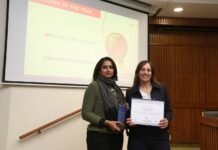Established in 2011 to provide a platform for Indian publishing professionals to acquaint themselves with the latest business trends and technologies that impact publishing, the Publishing Next conference has grown in stature and recognition among the publishing fraternity in India. The 5th edition (there was an extra one-day edition at this year’s World Book Fair in Delhi in February) of this conference will take pace on 19 and 20 September 2014 at the Krishnadas Shama State Central Library in Panaji, Goa.
The conference has traditionally mixed panel discussions, ‘how-to’ workshops and insightful experience- sharing presentations. This year’s topics shift the orientation of the conference towards outcomes and results. Leonard Fernandes, co- founder of Publishing Next, explains that this year, “There is a concerted effort to ensure that participants have something to take back home, whether its new ideas they can incorporate in their business, or technical skills they can use to improve their services.”
While the organizers usually shy away from a special conference theme, this year’s choice of topics so far, underline the need to ‘make publishing work for publishers.’ Panel discussions introduce new trends in
publishing to be considered and industry practitioners can consider either adapting to, or adopting these trends. In a similar vein, panel discussions on new trends in graphic books, open publishing, and a workshop on monetizing back lists are planned.
The focus on analysing aspects of the Indian publishing industry with the aim of providing insights useful to publishers, continues in the 5th edition of the conference. Ongoing panels on Indian language publishing and ePublishing in India will bedeepened and strengthened.
The panel on Indian language publishing, in particular, is a unique feature not seen in other conferences of this kind, and analyzes aspects of the publishing activity in various Indian languages, three to four languages at a time at each conference. In the recently concluded edition during the Delhi World Book Fair in February 2014, book publishing in Santhali, Punjabi and Maithili were discussed.
In addition, there will be a panel discussion on the state of poetry in India. Titled ‘Worse off without verse?’ the panel will discuss the economics of poetry publishing and the challenges in being accessible, or literary, or both. The state of readership and sales of poetry in the Indian languages — and the need, if there is one, to give poetry a boost. Similarly, a panel ‘Are there enough good books for children?’ will examine the quality of books available for children and examine how books are being made accessible to children. It will discuss the role of the retail trade and the effectiveness of state- sponsored library systems in providing
access to good books. Innovations in this area, especially new formats like eBooks, apps and transmedia content, will also be discussed.
7 panels 4 workshops
A total of 7 panel discussions and 4 workshops are planned. While the conference previously featured 8 to 10 workshops in the past, the number of workshops have been curtailed so that more time can be spent on each workshop to make it more effective for the participants. Among the planned workshops are one on copy editing — scheduled in deference to sustained requests, and another on the processes involved in the development of eBooks.
In addition, Publishing Next has announced that it will give away industry awards this year. The five categories eligible for the awards will be Publisher of the Year, Publishing Entrepreneur of the Year, Bookstore of the Year, Printed Book of the Year, and Digital Book of the Year. It will be interesting to see how these awards evolve and how the publishing
industry responds to these awards especially as the organizers say that the number of categories will be increased each year.
The stage is therefore set for a very exciting conference which is part of a growing and maturing industry that needs to become more of a community. The organizers hope that their efforts will again be appreciated by publishing professionals from across the country and that the event will continue to make its way towards financial and intellectual viability.


















